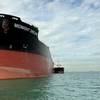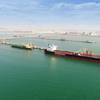NOL 3Q Results
Group EBIT for 3Q08 of $52m was down 75% from 3Q07, while third-quarter revenue was up 16% year-on-year to $2.4b.
Announcing the results, NOL Group President and Chief Executive Officer, Mr. Ron Widdows, said: “The Group continued to generate a profit in the third quarter despite the deterioration of conditions in the container shipping market.”
“Reduced demand in key trade lanes, combined with cost increases and worsening global economic conditions have adversely impacted our profit performance in the third quarter.”
“Against this challenging backdrop, our Logistics business delivered satisfactory earnings in 3Q08.”
Business Sector Focus
In 3Q08, NOL’s Container Shipping business, APL, recorded a 10% year-on-year rise in volumes in the third quarter to 622,000 FEU, driven primarily by the Intra-Asia trade, as well as an increase in Asia-Europe and Transpacific backhaul volumes.
“APL volumes grew on a year-on-year basis, but overall demand in the main trades slowed considerably in the third quarter,” said Mr Widdows.
APL’s average third-quarter 2008 overall headhaul utilization level was 90%, compared to 99% in 3Q07.
Average revenue per FEU for Container Shipping in 3Q08 was 8% higher year-on-year, reflecting continued fuel cost recovery measures. Total revenue for 3Q08 rose by 22% over the prior year to $2.04b and by 28% for the year to date to $5.98b.
However, APL’s 3Q08 EBIT decreased to $9m driven largely by lower core freight rates in the Asia-Europe trade and, increasingly, the long-leg Intra-Asia trades, which have been impacted by capacity cascaded from other trades, principally Asia-Europe.
Core Asia-Europe headhaul freight rates (excluding bunker adjustment factors) came under severe downward pressure as demand softened and the trade anticipated the high number of large container vessels due to enter service in 2009/2010.
Mr Widdows said: “Asia-Europe experienced a premature collapse, triggered by a sizeable drop in demand and reduced core rate levels as the market factored in a future vessel capacity overhang due to the number of very large container ships scheduled to enter the trade.”
Headhaul volumes in the Transpacific contracted in 3Q08; a factor which may be further compounded by the global financial crisis and economic slowdown.
“We are acting quickly and decisively to trim capacity and reconfigure our service networks, adjusting port calls and service loops and withdrawing a number of vessels from service. These actions will reduce our costs and better align APL’s service networks to the lower demand levels currently being experienced,” Mr Widdows said.
Mr Widdows said APL’s capacity in the Asia-Europe trade would be reduced by close to 25%, with around 20% of the company’s Transpacific tonnage also to be removed from service. Key changes are also underway in the Intra-Asia trades, he added.
“Despite the excellent progress made on fuel recovery, APL’s bottom line performance was affected by a materially different cost environment – particularly for fuel, which rose by 76% in 3Q08 over the prior year,” he said.
APL Logistics delivered a 42% increase in EBIT to $17m for the third quarter, although Logistics revenues registered a slight 1% decline to $315m in 3Q08.
Mr Widdows said: “In a challenging environment, APL Logistics has continued to drive profitability by focusing on cost and service delivery to our customers. The region continued to grow its revenue contribution supported by seasonal export volumes.”
Outlook
The recent collapse in world financial markets and resulting global economic uncertainty can be expected to lead to lower demand for container shipping services and reduced shipment levels and vessel utilizations. Logistics services will likely be impacted by a scaling back of electronic, automotive and retail shipments in coming months. These factors are creating very difficult operating conditions in the transportation and logistics sectors and placing pressures on profitability.
It is reasonable to expect a more pronounced and prolonged downturn than previously forecast for the container shipping industry.
Although the NOL Group has been profitable in the first three quarters of the year, an operating loss is expected for the fourth quarter.
In the face of these challenging conditions, the company is focused on managing costs and productivity, optimizing yields and keeping its asset base tight by reducing capacity and adjusting its global service network.












